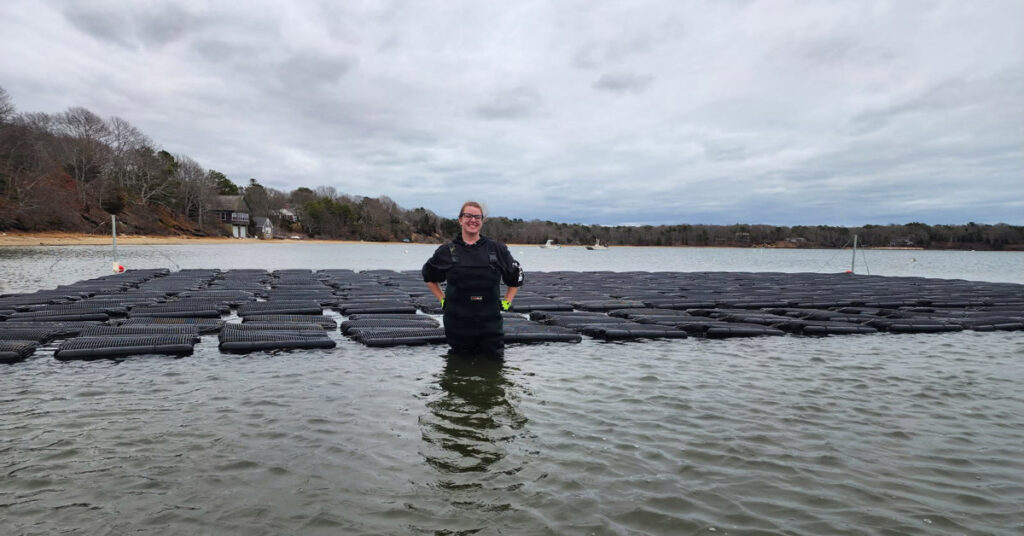Caring for shellfish off Cape Cod

Jenny Russas ’26 supports shellfish farming in Falmouth Harbor
This summer, Jenny Russas ’26 jumped into a project designed to improve the environment. Serving as a marine and environmental services (MES) intern with the Town of Falmouth Harbor Master’s office, she spent much time in the waters off the Cape Cod coast.
At the MES, Russas, an environmental science major, supported the Massachusetts Division of Marine Fisheries’ Shellfish and Biological Services. She helped build and repair gear—including the silos used to raise shellfish from seed, as well as the bags used to deploy shellfish into a farm—and maintain the farms, where the shellfish reside. Russas also helped to direct and instruct volunteers about MES projects and how to do them.
Working in an immersed “office” came naturally to Russas, who was a member of a swim team while growing up and later became a certified lifeguard.
“From my internship experience, I have learned and have gotten a better understanding of how shellfish are grown, the methodology behind it, how different environmental parameters affect shellfish (such as temperature, salinity, dissolved oxygen and food availability), and the different benefits behind the aquaculture of shellfish,” Russas said.
Falmouth’s shellfish farming began in 2011 and is a growing industry for the town, which aims to produce 1.3 million oysters this year through an expanding public-private aquaculture program.
According to the National Oceanic and Atmospheric Administration Fisheries, shellfish farms provide sustainable seafood and are considered low-to-no-input as they don’t require feed, freshwater or fertilizer. Shellfish eat algae by filtering it from the water. They feed on nitrogen, a nutrient that has saturated Falmouth’s waterways, causing water quality to worsen and ecosystems to deteriorate. In addition to improving water quality, shellfish farming produces an edible product that contributes to the area’s economy.
Considering pursuing a master’s degree in emergency management and marine safety after she graduates, Russas has enjoyed her internship and a peek into the environmental industry. “
My internship has provided hands-on experience in the environmental field I hope to work in,” she said. “It helped me see how classroom knowledge can connect to real-world environmental work and confirmed that I want a job focused on hands-on outdoor work. It has also shown me the importance of community involvement and helped me realize that working with volunteers and doing outreach is important to me.”
Russas believes that her Wheaton education has prepared her well for life after graduation. “It has given me a strong foundation in environmental science, while helping me build critical thinking, problem-solving and communication skills.”
She touted how Wheaton’s small class sizes enabled her to connect with professors, learn from their experiences and conduct independent research. “Wheaton has encouraged me to think about the broader impacts of environmental work and the importance, which I know will guide me as I make the move into my career after college.”
